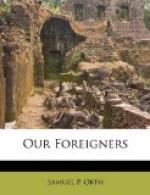But, if material were available for a comprehensive analysis of American leadership in life and thought today, a larger number of names of non-native origin would no doubt appear than was disclosed in 1891 by Senator Lodge’s analysis. All the learned professions, for instance, and many lines of business are finding their numbers swelled by persons of foreign parentage. This change is to be expected. The influence of environment, especially of free education and unfettered opportunity, is calling forth the talents of the children of the immigrants. The number of descendants from the American stock yearly becomes relatively less; intermarriage with the children of the foreign born is increasingly frequent. Profound changes have taken place since the American pioneers pushed their way across the Alleghanies; changes infinitely more profound have taken place even since the dawn of the twentieth century and have put to the test of Destiny the institutions which are called “American.”
Nevertheless in a large sense every great tradition of the original American stock lives today: the tradition of free movement, of initiative and enterprise; the tradition of individual responsibility; the primary traditions of democracy and liberty. These give a virile present meaning to the name American. A noted French journalist received this impression of a group of soldiers who in 1918 were bivouacked in his country: “I saw yesterday an American unit in which men of very varied origin abounded—French, Polish, Czech, German, English, Canadian—such their names and other facts revealed them. Nevertheless, all were of the same or similar type, a fact due apparently to the combined influences of sun, air, primary education, and environment. And one was not long in discovering that the intelligence of each and all had manifestly a wider outlook than that of the man of single racial lineage and of one country.” And these men were Americans.




